Best Blueberry Fertilizer Recommendations For Bushes & Potted Plants
Blueberries are acid loving plants. Add soil acidifiers to make the planting area more fruit bearing. You can use a balanced sulphate based ammonium fertilizers as well but make sure to stay away from nitrate based products.
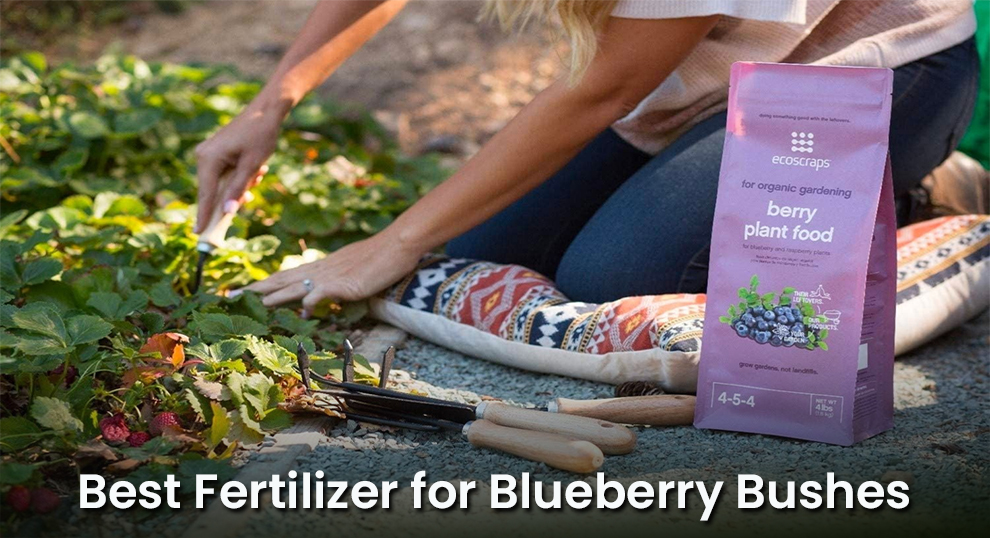
When cultivating thriving blueberry bushes, choosing the right fertilizer is crucial. Blueberries have a specific requirement when it comes to nutrient supplementation.
The best fertilizer for blueberry bushes is a balanced one if your soil is of good quality. Otherwise you may emply fertilizers rich in nitrogen, but you cannot use all nitrogen sources.
Blueberries thrive when provided with fertilizers containing an ammonium form of nitrogen, such as ammonium sulfate, sulfur-coated urea, urea, or cottonseed meal.
Further, fertilizers meant for rhododendrons and azaleas also work for blueberries.
| But please don’t use plant food for blueberry bushes with nitrate-based nitrogen. These are toxic to plants. |
Blueberries respond well to frequent but small fertilizer doses across the growing season. Applying plant foods on three separate occasions is recommended.
The first is when new growth emerges in spring, the next six weeks later, and finally shortly after harvest.
By picking the apt fertilizer and adhering to the recommended timing and application methods, you provide the blueberry bushes with the nutrients necessary for vigorous growth and production of bountiful and delicious fruits.
- Natural Fertilizer for Blueberries – Down to Earth All Natural Acid Mix Fertilizer
- Overall Best Pick – Espoma Organic Berry-Tone Organic Fertilizer
- Best for Indoors and Outdoors – Big A Berries Fertilizer
What Fertilizer Do Blueberries Need?
For blueberries to thrive and yield, they need a balanced supply of the BIG 3 nutrients – NPK or Nitrogen, Potassium, and Phosphorous. But you must provide your blueberry bushes with the ideal dose of nitrogen, as employing the standard nitrate-based fertilizer can be dangerous.
Instead, pick the best blueberry fertilizer formulated for acid-loving plants containing the vital sulfur or ammonium form of nitrogen that blueberries require. Look for granular acid plant fertilizers with an NPK ratio ranging from 4-3-4 to 4-3-6.
These plant foods work for azaleas, blueberries, rhododendrons, and most other acid-loving species. Such fertilizers offer the plant the vital nutrients to maintain healthy growth habits and ensure a fruitful harvest.
Blueberry Fertilizer Recommendations for Acidifying Soil
Blueberries thrive in high-acidity soils. If the planting area for your blueberries lacks natural acidity, it becomes crucial to amend the soil with an acidifier to form an optimal environment for blueberry growth.
When picking an acidifier, opt for the one with a long-term effect on the soil for better results in the subsequent years. Hence, you must employ a high-acid plant food, especially in areas where the soil pH has been adjusted to accommodate blueberry cultivation.
Hunt for the best fertilizer for blueberry bushes containing sulfur-coated urea or ammonium sulfate, as they have a lower pH and offer the necessary acidity.
Further, be mindful of potential deficiencies in iron or magnesium, which you can fix with a suitable blueberry fertilizer containing the necessary nutrients.
To ensure proper feeding, opt for a water-soluble, acidic fertilizer ideal for blueberries, as blueberries thrive in a pH range between 4.5 and 5.5.
Here are the three best soil acidifiers for blueberry soil
- Blueberry Bush Granular Sulfur Fertilizer
- Easy Peasy Plants Ammonium Sulfate
- Espoma Organic Soil Acidifier
Top Four Blueberry Fertilizers That Provide A Balanced Feed To Blueberry Plants
Finding a suitable fertilizer for different types of blueberry bushes is crucial for their optimal growth and fruit production. Here are four top recommendations to consider:
1.Down to Earth All Natural Acid Mix Fertilizer
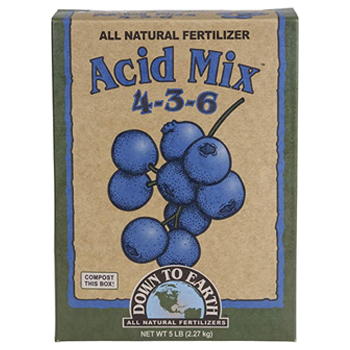 |
Check price on Amazon |
Down to Earth, All Natural plant food provides acid mix, a specifically blended, powder-form fertilizer suitable for acid-loving plants like blueberries, azaleas, raspberries, hydrangeas, rhododendrons, and many other evergreen trees.
The 4-3-6 formulation promotes lush flowers and fruits when applied during bloom periods and vegetative growth. Fall applications help stimulate root growth and accentuate resistance to harsh winter temperatures.
This five-pound box has a balanced combination of nutrients, comprising 3.0% available phosphate, 4.0% total nitrogen, and 6.0% soluble potash. Beyond this, this is also the best blueberry fertilizer with humic acids derived from Leonardite, sulfur, magnesium, and calcium.
Follow the advised application rates for new gardens, established berry plants, and transplanting berries to optimize growth and promote hefty yields.
2. Espoma Organic Berry-Tone Organic Fertilizer
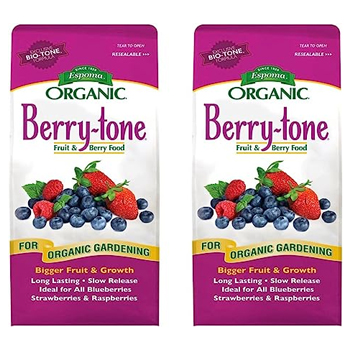 |
Check price on Amazon |
Manufactured by the Espoma Company, a trusted leader in natural organics since 1929, the berry-tone natural and organic fertilizer is a granular product that works for all berries, including blackberries, raspberries, strawberries, and blueberries.
It is enriched with bio-tone formula and has a 4-3-4 NPK analysis with 5 percent sulfur content. Tt is environmentally safe and has no toxic sludges or ingredients.
You can use this ready-to-use plant food during planting blueberries or on the established plants. Feed your berries twice every year in late and early spring for the best results. Berry-tone is approved for organic gardening and caters to all the requirements for organic production,
3. Big A Berries Fertilizer
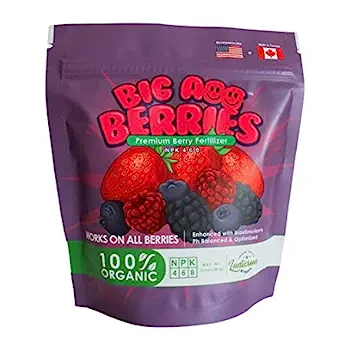 |
Check price on Amazon |
With NPK 4-6-8, it is one of the most common blueberry fertilizer recommendations. This plant food will benefit DIY growers who seek a sweeter, bigger, and juicier berry harvest. It is a safe and organic plant fertilizer that is versatile and suitable for raspberries, strawberries, blackberries, blueberries, and more.
You will get it in a convenient resealable pouch with clear instructions and helpful tips. Crafted by the experienced team at the Big Gardens Company, this plant food is specialized to offer necessary mineral supplements for optimizing berry growth.
It has a premium blend of organic ingredients and ideal nutrients like phosphorous, potassium, nitrogen, magnesium, and calcium.
4. True Organic – Berry & Fruit Plant Food
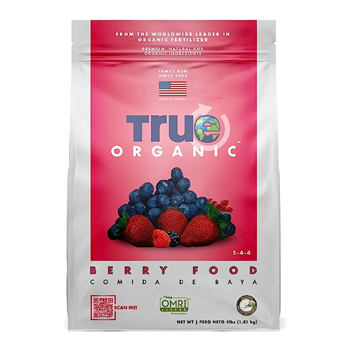 |
Check price on Amazon |
It is an organic mix with a 5-4-5 NPK formula and offers vital nutrients for your blueberries, strawberries, blackberries, and raspberries.
This True Organic plant food also contains sulfur and calcium, beyond the blend of natural ingredients like fish bone meal, poultry manure, seabird guano, soybean meal, potash, crab, and shrimp shell meal.
You can use this plant food as it promotes abundant blossoms, lush foliage, and bountiful fruits by supplying the correct dose of nitrogen, potassium, and phosphorous.
Unlike conventional plant feeds, the True Organic product can replenish the soil and support organic planting. You can use it for container and in-ground plants, including raised garden beds and houseplants.
What Is The Best Natural Fertilizer For Blueberries?
Consider the Down to Earth Acid Mix 4-3-6 (NPK) from Arbico Organics if you prefer natural nutrients. It is one of our top blueberry fertilizer recommendations for acid-loving plants such as blueberries, hydrangeas, camellias, azaleas, and raspberries.
Adjust the application rates as specified on the product packaging. You can also use coffee grounds or sphagnum peat moss to lower soil pH which is necessary for blueberries.
You may opt for composted animal manure, blood meal, or worm castings to meet the nitrogen requirements. To avoid root damage, mix high-nitrogen sources with compost. Bone meal and seaweed in powdered or liquid form are natural sources of phosphorus and potassium, promoting flowering, fruiting, and disease resistance.
Which Is The Best Homemade Fertilizer For Blueberries?
Here are the three best fertilizers for blueberries in pots if you do not want to opt for the chemical alternatives:
1. Coffee grounds: To fertilize blueberries, sprinkle around four to five cups of coffee grounds around every blueberry bush. Rake the grounds into the top layer of the soil. Repeat the process every two to four weeks or as needed.
2. Eggshells: Adding eggshells into the garden also helps elevate the soil acidity and improve the conditions, making them conducive for blueberries.
3. Epsom Salt: If your blueberry plant does not have magnesium, you can use Epsom salt to offer blueberries temporary relief. You can sprinkle around ¼ cup of Epsom Salt in 10-inch diameter around the plant and water thoroughly.
If the soil has a high pH, excess magnesium might not address the underlying issue, and the sulfur in Epsom salt does not impact the pH levels.
Best Way To Fertilize Blueberry Bushes
You must prep the soil by loosening it around the plant’s base for best results and recommended feeding. It helps better mix the fertilizer with the plant’s roots sans causing any harm to the stems, branches, or foliage.
If the fertilizer accidentally comes in contact with the plant parts, you must immediately brush it away to avoid burning. If mulch has been applied during the off-season, remove it before spreading the fertilizer around the plants.
Once the fertilization process is complete, place the mulch back on top of the soil to ensure the nutrients properly integrate into the soil and reach the plant’s roots.
After applying the fertilizer, it is essential to water the area thoroughly, allowing the nutrients to penetrate the soil and benefit the blueberry plants.
When Should Blueberries Be Fertilized?
To ensure steady growth in blueberries, start fertilizing early in the spring. This annual routine accentuates the plant’s health across the growing season, allowing for optimal development and ensuring increased benefits in the plantation or garden.
In the first two years of blueberry growth, consider offering an additional dose of any of the fertilizer for blueberry bushes listed above for 1-2 months. After the initial application, make sure it is followed by another dose by the end of spring.
But if your blueberry bushes are already established and planted in acidic soil, you do not need to offer additional feeding.
For container-planted blueberries with high pH levels, fertilize them for the remaining growing season, not exceeding a period of two months.
What Month Do You Not Fertilize Blueberries?
Never feed your blueberries during late summer and fall, typically from August to October. This period lets the plant naturally prepare for dormancy and transition into winter.
Even if you use the best blueberry fertilizer, feeding during this period can stimulate new growth, which can be vulnerable to cold temperatures and harm the plant’s health. Thus, consider specific climatic and regional factors, the plant’s condition, and the overall needs before deciding.
It is always advisable to consult local gardening resources or experts for precise recommendations based on your specific location.
How Often Do You Fertilize Container Blueberries?
The fertilization frequency can vary depending on several factors, such as the container size, potting mix, and plant age. Typically, you must feed the container blueberries every four to six weeks during the growing season, from the spring to early fall.
Monitor the plant’s growth and health to determine the precise frequency and timing and alter the schedule accordingly.
Do not over-feed, as it may result in nutrient imbalances and damage the plants. Before feeding, ensure the soil is moist, as adding plant food to the dry soil can lead to root burn.
Related: Blueberry Lifespan | Blueberry Plant Care
Final Thought
Our extensive guide can help you select the best feed for blueberry bushes or other acid-loving plants.
Drawing from our experience, we recommend performing a soil assessment test before you feed the plants to assess the soil’s pH level before picking a fertilizer from the list that aligns with your gardening or farming requirements.
For those seeking safe fertilizer choices, the Espoma Organic Berry-Tone Organic Fertilizer is a commendable option that delivers exceptional outcomes.
